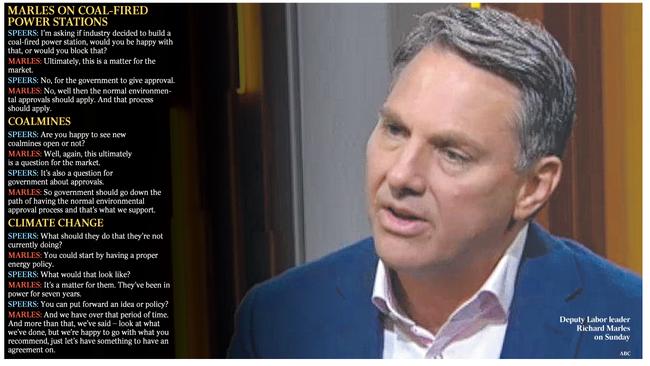Richard Marles in struggle for safe ground on coal-fired power
Richard Marles has failed to say whether he supports new coal-fired power plants or coalmines.

Deputy Labor leader Richard Marles has failed to say whether he supports new coal-fired power plants or coalmines, as the Victorian CFMEU backed high-efficiency, low-emission coal and nuclear energy over renewables.
The union also said the transitioning of coal-fired power station workers and their communities towards a modern nuclear power industry was realistically achievable, but a “‘just transition’ to renewables is not”.
Mr Marles struggled to clarify on Sunday whether Labor would allow a coal-fired power station to be built if industry funded the project, but suggested a future Labor government would not stand in the way if it met “normal environmental approvals”.
“A Labor government is not going to put a cent into subsidising coal-fired power. And that is the practical question as to whether or not it happens,” Mr Marles told the ABC’s Insiders program.
"Coal will continue to play a part within our economy for decades to come," @RichardMarlesMP tells @David_Speers on #Insiders #auspol pic.twitter.com/qnTyKCEdNA
— Insiders ABC (@InsidersABC) February 8, 2020
Mr Marles’ confusing messages on coal came as the Victorian branch of the Construction Forestry Maritime Mining and Energy Union urged the state to embrace HELE coal and nuclear power to both deliver reliable energy and achieve net zero emissions by 2050.
In its submission to the Victorian parliament’s inquiry into nuclear prohibition, the union’s mining and energy division’s state secretary, Geoff Dyke, said HELE coal combined with carbon capture and storage was the “preferred option” but a transition to nuclear energy was also worth considering.
“A ‘just transition’ of coal-fired power station workers and their communities towards a modern nuclear industry is realistically achievable, whereas CFMEU Mining and Energy Vic believes a ‘just transition’ to renewables is not,” Mr Dyke said.
“More importantly, a ‘just transition’ to nuclear power could provide the essential social licence for this proven technology to overcome lingering public concerns surrounding its safe operation in local communities where they might be located if, locally, they were to replace existing coal generators.
“Would you like to see a new coal fired power plant built in Australia?â€@David_Speers interviews Deputy Labor Leader @RichardMarlesMP on #Insiders. #auspol pic.twitter.com/vu3GixW6bU
— Insiders ABC (@InsidersABC) February 8, 2020
“Australia certainly has the skilled people and stable government to run a first-class nuclear power industry.
“All that is needed is the green light.”
Mr Dyke warned Victoria should be powered by dispatchable energy supplemented by renewables “rather than just relying on renewables alone” to avoid major blackouts, unaffordable electricity and the shutdown of the state’s industry.
The call for a nuclear industry puts the CFMEU at odds with Opposition Leader Anthony Albanese, who has declared nuclear power does not stack up in Australia because it has “never overcome the dangers that we have seen played out around the world”.
New federal Resources Minister Keith Pitt, a staunch nuclear advocate, would not say whether transitioning coal workers to a nuclear industry had merit, but he acknowledged the jobs and skills required to run a coal or nuclear power station were the same.
“If you ignore the fuel source that provides the scheme, in a practical, pure engineering sense, the roles are exactly the same,” Mr Pitt said.
“If you’re in a technical trade in a power station and the power station is the same apart from the source of fuel, of course there are opportunities.”
Former Nationals leader Barnaby Joyce, also a big supporter of nuclear energy, said coal workers could be transitioned into nuclear jobs but the jobs must be available right away.
“If it becomes a theoretical promise, people don’t trust us enough to ever accept one of those,” he said.
Scott Morrison has made it clear the government would not consider nuclear energy unless there was bipartisan support.
Labor’s equivocation on the Adani coalmine in Queensland and ambitious climate change policies were considered critical to its 2019 election loss, which led to a disastrous result in Queensland and big swings against the party in coalmining seats.
Mr Marles, who once said the collapse of the global thermal coal market was a “good thing”, acknowledged coalminers played a “very significant” economic role and the industry would continue “for decades to come”.
Greens leader Adam Bandt attempted to wedge Labor, saying it was refusing to join with the minor party and stop “coal-huggers in the Liberals”.




To join the conversation, please log in. Don't have an account? Register
Join the conversation, you are commenting as Logout